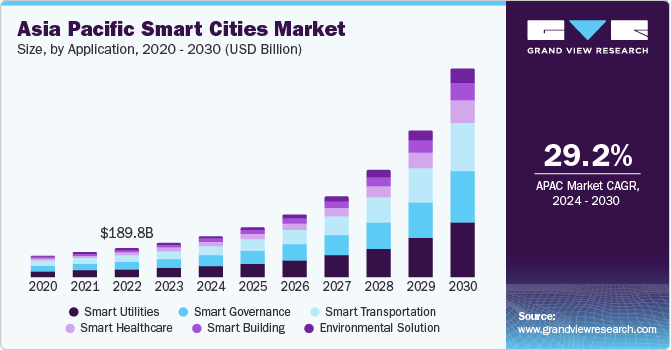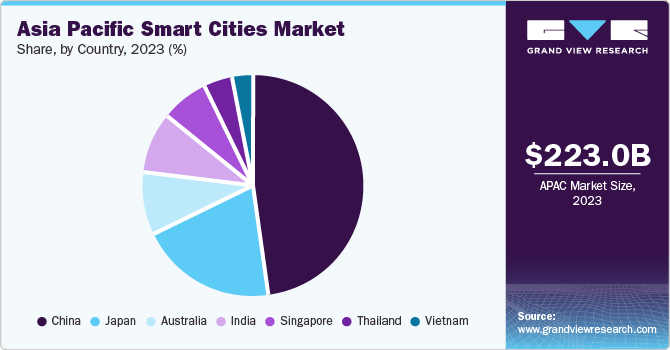Asia Pacific Smart Cities Market Trends
The Asia Pacific smart cities market size was estimated at USD 223.0 billion in 2023 and is expected to grow at a CAGR of 29.2% from 2024 to 2030. This growth is attributed to the increasing government initiatives to manage the needs of the expanding urban population in the region. Furthermore, the rising demand for fast and effective transport, public safety concerns, and the need for resource management and sustainable development are further accelerating smart city adoption in Asia Pacific.

Asia Pacific accounted for a revenue share of 29.8% in the global smart cities market in 2023. The Asia Pacific market for smart cities is witnessing rapid growth, driven by government initiatives to manage urbanization and the necessity for effective resource management for sustainable development. The incorporation of advanced technologies such as the Internet of Things (IoT), Artificial Intelligence (AI), and big data analytics into urban infrastructure is enhancing resource utilization and refining residents' quality of life. These advancements have prompted governments to introduce smart city initiatives, which are anticipated to create growth opportunities for the market in the region.
However, the market faces challenges such as data abuse risks and reluctance to adopt new technologies. The latest trends comprise the rising use of 5G technology for improved internet connectivity and the production of autonomous drones and connected vehicles.
Application Insights
Based on the application, the market is categorized into smart governance, smart building, environmental solutions, smart utilities, smart transportation, and smart healthcare. The smart utilities application segment led the market and accounted for the largest revenue share of 28.8% in 2023. This can be attributed to the increasing adoption of utility solutions to enhance performance and improve operational transparency. The increasing utilization of digital technologies, such as advanced analytics and IoT, to develop new business and operating models also contributes to the segment’s growth.
The smart utilities segment is further categorized into energy management, water management, and waste management. The energy management segment accounted for the largest revenue share of more than 50.0% in 2023. This can be attributed to proactive methods implemented by governments to meet energy management standards. In addition, growing urbanization and the focus on reducing energy consumption per unit of GDP are driving the segment's growth. Furthermore, the development of Building Energy Management Systems (BEMS) and the implementation of smart grids and smart meters contribute to enhancing energy efficiency in buildings.
The water management segment also held a significant market share in 2023 owing to rapid urbanization, growing consumer awareness, and technological developments. In addition, the adoption of IoT devices and AI-powered algorithms is transforming water management, enabling real-time monitoring, predictive maintenance, and dynamic pricing, which are contributing to the segment's growth.
The smart governance segment also witnessed significant growth in 2023, owing to the increasing adoption of digital platforms for citizen engagement, the growing need for operational transparency, and the utilization of advanced technologies like IoT and AI to develop governance effectiveness. These initiatives aim to improve public services, ensure emergency readiness, and enhance citizen safety, contributing to the overall development and sustainability of smart cities in the region.
Country Insights
China Smart Cities Market Trends
The China smart cities market accounted for the largest revenue share of 46.2% in 2023. This growth is driven by the government's top-down approach, led by significant investments, and has enabled the rapid development of smart cities. In addition, the country's rapid urbanization, robust economic growth, and growing focus on digital infrastructure have contributed to the market's growth. Furthermore, the adoption of innovative technologies such as IoT, AI, and blockchain has also played a vital role in enhancing urban management and public services, further driving the market's expansion.

Japan Smart Cities Market Trends
The smart cities market in Japan held a significant revenue share in 2023 owing to collaboration between key players such as Oracle and Mishima City, which aims to provide a digital platform for smart cities and address social challenges through digital technology.
India Smart Cities Market Trends
The India smart cities market is expected to grow rapidly in the coming years due to the growing population, decreasing natural resources, and rising migration to urban areas. In addition, strategic government initiatives focusing on public safety, resource optimization, and urban infrastructure planning, together with important investments, are further driving the India market growth.
Key Asia Pacific Smart Cities Company Insights
Market players are implementing strategies such as leveraging interconnection-oriented architecture, integrating IoT and AI, and prioritizing sustainable development to maintain their market presence and stay ahead of the competition. These strategies facilitate efficient resource management, enhance public safety, and promote environmental sustainability, thereby driving growth and innovation in the region.
Key Asia Pacific Smart Cities Companies:
- Huawei Technologies Co., Ltd.
- Advantech
- Hikvision
- Dahua Technology.
- FiberSense Pty Ltd
- XENIUS
- Excelpoint
- Aquasoft
- Atoma Technology
- ASCS Atlantis Smart City Solutions
Recent Developments
-
In February 2024, Huawei unveiled its next-gen smart city solutions at a roundtable event focused on advancing city intelligence. The City Intelligent Twins architecture integrates IoT, cloud computing, big data, and AI to optimize city operations and improve residents' quality of life. This innovation aims to support the sustainable development of smart cities.
-
In April 2024, Advantech announced the acquisition of Aures Technologies SA, which is prominent for its kiosk solutions and point-of-sale. This tactical move is planned to improve Advantech's presence in smart retail products and services worldwide, eventually positioning the business as a leading provider of smart retail solutions worldwide.
Asia Pacific Smart Cities Market Report Scope
|
Report Attribute
|
Details
|
|
Revenue forecast in 2030
|
USD 1,342.2 billion
|
|
Growth rate
|
CAGR of 29.2% from 2024 to 2030
|
|
Base year for estimation
|
2023
|
|
Actual data
|
2018 - 2022
|
|
Forecast period
|
2024 - 2030
|
|
Quantitative units
|
Revenue in USD billion and CAGR from 2024 to 2030
|
|
Report coverage
|
Revenue forecast, competitive landscape, growth factors, and trends
|
|
Segments covered
|
Application, country
|
|
Regional coverage
|
Asia Pacific
|
|
Country coverage
|
China; Japan; Australia; India; Singapore; Thailand; Vietnam
|
|
Key companies profiled
|
Huawei Technologies Co., Ltd.; Advantech; Hikvision; Dahua Technology.; FiberSense Pty Ltd; XENIUS; Excelpoint; Aquasoft; Atoma Technology; ASCS Atlantis Smart City Solutions.
|
|
Customization scope
|
Free report customization (equivalent to up to 8 analyst working days) with purchase. Addition or alteration to country, regional & segment scope
|
|
Pricing and purchase options
|
Avail customized purchase options to meet your exact research needs. Explore purchase options
|
Asia Pacific Smart Cities Market Report Segmentation
This report forecasts revenue growth at a country level and analyzes the latest industry trends in each of the sub-segments from 2018 to 2030. For this study, Grand View Research has segmented the Asia Pacific smart cities market report based on application and country:
-
Application Outlook (Revenue, USD Billion, 2018 - 2030)
-
Smart Governance
-
Smart Building
-
Environmental Solution
-
Smart Utilities
-
Energy Management
-
Water Management
-
Waste Management
-
Smart Transportation
-
Smart Healthcare
-
Country Outlook (Revenue, USD Billion, 2018 - 2030)
-
Asia Pacific
-
China
-
Japan
-
Australia
-
India
-
Singapore
-
Thailand
-
Vietnam













